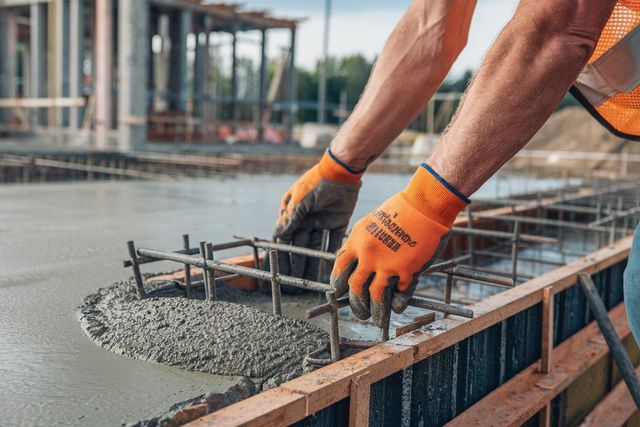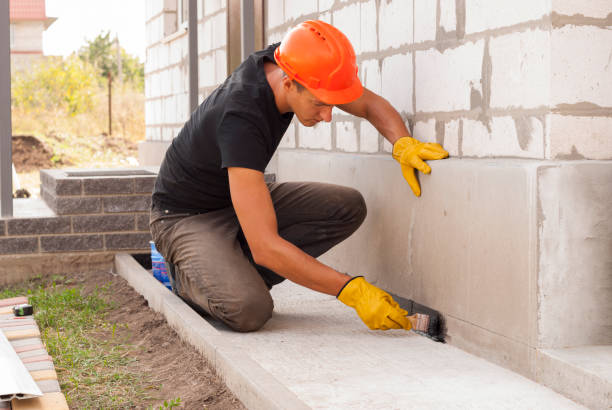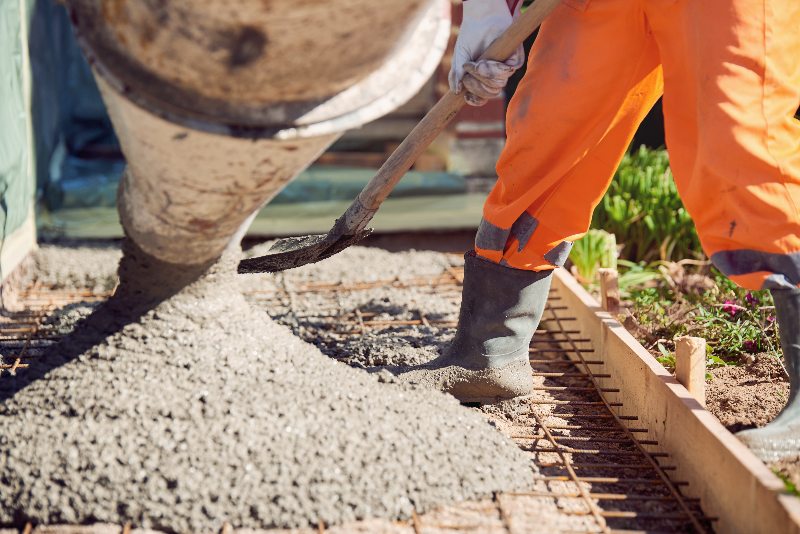
Understanding the Essential Duty of a Concrete Contractor in Modern Construction and Layout
Concrete contractors are important to the building and layout sectors. Their proficiency guarantees that frameworks are not just durable however also cosmetically pleasing. They involve in numerous obligations, from task preparing to high quality control, and work together with architects and engineers. With progressing fads and modern technologies, their role is a lot more vital than ever before. Comprehending their impact can reveal understandings into contemporary building techniques and the future of structure style.
The Value of Concrete in Building and construction
Although numerous materials are employed in building, concrete continues to be a foundation of contemporary building methods as a result of its durability, strength, and convenience. This composite material, made from cement, water, and accumulations, can hold up against significant tension and is immune to fire, weather, and bugs, making it suitable for varied applications. Concrete's versatility permits it to be formed into numerous sizes and shapes, assisting in innovative architectural layouts.
Moreover, its thermal mass residential properties add to power efficiency, assisting to control interior temperature levels. The prevalent availability of resources and the relatively affordable of concrete also improve its appeal for large projects, from commercial buildings to framework like bridges and roads. As urbanization remains to climb, the need for trustworthy and lasting structure materials solidifies concrete's crucial role in construction, making it a fundamental option for builders and designers intending for long life and durability in their projects.
Key Responsibilities of a Concrete Professional
Concrete service providers play a crucial function in the building process, with a number of vital obligations that guarantee task success. Their tasks consist of task preparation and design, material choice and management, as well as keeping quality control and assurance throughout the job lifecycle. Comprehending these duties is vital for valuing the specialist's effect on construction results.
Task Preparation and Design
When starting on a building and construction job, effective task preparation and layout play a crucial function in a concrete contractor's obligations. The service provider must collaborate carefully with architects, clients, and designers to understand the job's goals and specs. This includes assessing site conditions, examining layout demands, and identifying the extent of job. A concrete service provider is additionally in charge of establishing budget plans and timelines, ensuring that all stages of the project align with general goals. In addition, they need to anticipate potential obstacles and devise services to maintain job efficiency. By meticulously preparing and making each element of the concrete job, the professional establishes the structure for effective execution, making sure structural stability and adherence to safety and security standards throughout the building procedure.
Material Option and Management
Efficient product choice and administration are essential obligations for a concrete professional, as these choices straight influence the high quality and longevity of the last structure. Concrete service providers have to examine various products, consisting of aggregates, admixtures, and reinforcement kinds, to guarantee they meet task specs and environmental conditions. They should think about aspects such as resistance, workability, and toughness to weathering. Furthermore, handling the supply chain is crucial, as timely shipment of products can extremely affect task timelines. Professionals need to preserve relationships with suppliers to protect top notch resources while also keeping an eye on supply levels to prevent shortages or excesses. Eventually, this mindful selection and administration of products add to the general success of building and construction jobs and the long life of the frameworks constructed.
Quality Assurance and Guarantee
Quality control and guarantee are critical in the building market, especially for concrete contractors tasked with supplying resilient and dependable frameworks. Concrete contractors have to apply extensive quality control actions throughout the building and construction procedure, guaranteeing that all products fulfill specified policies and criteria (TJ Concrete Contractor). This includes keeping an eye on the mixing, putting, and healing procedures to stop defects and boost structural integrity. Routine evaluations are essential, allowing contractors to determine and remedy problems without delay. In addition, concrete service providers usually team up with designers and architects to guarantee that the final item lines up with design specs. By sticking to rigorous top quality guarantee methods, concrete contractors not only secure the longevity of their work but also maintain the trust of clients and stakeholders in the building and construction sector
Kinds Of Projects Taken Care Of by Concrete Service Providers
Concrete contractors are typically connected with large building and construction projects, their experience extends to a varied variety of applications. These professionals are indispensable to residential tasks, such as structures, patio areas, and driveways, assuring durability and visual appeal. In commercial building and construction, they contribute to the production of floors, pathways, and architectural components that meet particular layout and safety standards.
Moreover, concrete service providers are included in infrastructure jobs, including bridges, tunnels, and roadways, where their skills ensure architectural stability and durability. They likewise play a pivotal duty in ornamental concrete applications, such as stamped concrete and refined surface areas, which improve the appearance of numerous areas. Furthermore, their services reach repair and maintenance job, addressing concerns like breaking or erosion in existing frameworks. This flexibility highlights the necessary role concrete service providers play in both practical and ornamental elements of modern-day building and layout.
Certifications and skills Needed
Concrete specialists should possess a varied set of qualifications and abilities to effectively take care of the variety of projects they carry out. Proficiency in concrete mixing, pouring, and completing is vital, Visit Website as is a strong understanding of various kinds of concrete, including strengthened and ornamental alternatives. Expertise of construction methods, plans, and task administration principles is crucial for successful implementation.
Physical stamina and stamina are crucial due to the demanding nature of the job. Specialists should likewise have solid problem-solving capabilities to resolve unexpected obstacles throughout tasks. Interaction skills are vital for coordinating with customers, engineers, and other tradespeople.
Furthermore, obtaining pertinent certifications can enhance a specialist's credibility and broaden their job chances. Continuous education in new techniques and materials keeps service providers affordable in a rapidly advancing industry. These qualifications and skills collectively make it possible for concrete professionals to provide top quality results effectively and properly.
The Function of Concrete Service Providers in Security Compliance
Guaranteeing safety and security compliance is a basic obligation of concrete contractors, as they browse the intricacies of construction websites. These professionals are tasked with adhering to rigorous security policies and requirements, which are crucial for stopping accidents and guaranteeing the well-being of all website employees. TJ Concrete Contractor. Concrete specialists must carry out comprehensive security plans that consist of training workers on correct tools use and safety methods
Furthermore, they are accountable for checking materials and work processes to identify potential hazards. By carrying out normal security audits and danger evaluations, concrete specialists can proactively resolve problems prior to they rise. Moreover, they work together with other construction specialists, such as designers and job managers, to integrate precaution into the overall job method. Ultimately, the dedication of concrete specialists to safety compliance not only shields employees however additionally improves project efficiency and quality, enhancing their essential function in modern building and construction.
Trends and Innovations in Concrete Layout
Recent improvements in concrete design have presented a series of trends and technologies that focus on sustainability and visual appeals. Sustainable concrete remedies, ornamental finishing techniques, and smart concrete innovations are improving the industry. These advancements not only enhance architectural honesty but also add to eco liable building and construction techniques.
Lasting Concrete Solutions
As the building and construction sector increasingly prioritizes sustainability, innovative concrete remedies are arising to minimize environmental impact while enhancing efficiency. One prominent trend is the usage of recycled products, such as smashed concrete and commercial by-products, which not just decreases waste however additionally enhances the concrete's homes. Furthermore, improvements in admixtures, including fly ash and slag, contribute to minimized carbon exhausts during manufacturing. Another considerable technology entails the advancement of absorptive concrete, which permits water to flow with and decreases overflow, minimizing flooding and groundwater deficiency. Furthermore, the surge of carbon capture innovations in concrete production holds guarantee for further discharges reduction. These sustainable concrete solutions exemplify the sector's dedication to eco accountable construction techniques.

Decorative Ending Up Techniques
A wide variety of attractive finishing techniques have arised in concrete layout, changing ordinary surfaces into aesthetically striking components. Strategies such as stamping, staining, and brightening enable a wide variety of visual opportunities, dealing with varied layout choices. Stamped concrete mimics all-natural materials like stone and block, while discoloring introduces dynamic shades that enhance the surface area's appeal. Polished concrete, understood for its streamlined surface, adds class to both industrial and residential rooms. Furthermore, microtopping and overlay systems give innovative options for moved here rejuvenating existing concrete. These methods not just enhance the aesthetic characteristics but additionally enhance sturdiness and maintenance. As patterns progress, the combination of ornamental coatings proceeds to play a crucial duty in modern building and construction, marrying functionality with creative expression.

Smart Concrete Technologies
While standard concrete continues to be a staple in building and construction, the introduction of wise concrete modern technologies is transforming the sector by incorporating innovative features that enhance performance and sustainability. These technologies consist of self-healing concrete, which utilizes ingrained bacteria that activate upon breaking, and sensor-equipped concrete that keeps an eye on architectural health in real-time. Furthermore, piezoelectric and thermochromic concrete can adapt to environmental modifications and produce electricity, specifically. The application of recycled materials and green ingredients also adds to minimizing the carbon footprint of concrete manufacturing. As these modern technologies remain to evolve, they guarantee to enhance longevity, lower maintenance expenses, and promote greener building methods, making them critical for future construction jobs. The role of concrete contractors is increasingly substantial in taking advantage of these developments.
Frequently Asked Questions
What Elements Impact Concrete Rates in Building Projects?
Concrete pricing in construction projects is affected by sites material costs, labor expenditures, job size, location, accessibility of sources, and market need. Seasonal variables and transportation costs can likewise substantially impact the general prices structure.
Just How Do Climate Condition Influence Concrete Job?
Weather substantially influence concrete work; severe temperature levels, moisture, and precipitation can affect establishing times, curing procedures, and general quality - TJ Concrete Contractor. Professionals must adjust their techniques and timetables to mitigate these ecological impacts for effective project conclusion
What Is the Typical Timeline for a Concrete Project?
A normal concrete task timeline varies from a few days to a number of weeks. Elements influencing this duration include project size, intricacy, weather conditions, and treating times, which jointly establish the general conclusion routine.
Can Concrete Service Providers Help With Layout Appointments?
Concrete service providers can without a doubt help with style consultations, providing valuable understandings on product choice, architectural honesty, and aesthetic alternatives, guaranteeing that projects satisfy both practical needs and the client's vision for the ended up product.
What Prevail Mistaken Beliefs Regarding Concrete Sturdiness?
Typical misconceptions about concrete longevity consist of the belief that it is invulnerable to damage which all kinds are equally strong. In fact, factors like mix style, environmental conditions, and upkeep significantly influence concrete's long-lasting efficiency.
They additionally play a critical role in ornamental concrete applications, such as stamped concrete and refined surface areas, which enhance the visual facet of various areas. Effectiveness in concrete mixing, putting, and ending up is essential, as is a strong understanding of various types of concrete, including enhanced and ornamental alternatives. One noticeable fad is the use of recycled products, such as smashed concrete and industrial byproducts, which not only decreases waste however additionally improves the concrete's residential or commercial properties. While conventional concrete stays a staple in construction, the appearance of clever concrete modern technologies is reinventing the sector by incorporating innovative functions that enhance performance and sustainability. These advancements consist of self-healing concrete, which utilizes embedded microorganisms that activate upon splitting, and sensor-equipped concrete that checks architectural health and wellness in real-time.